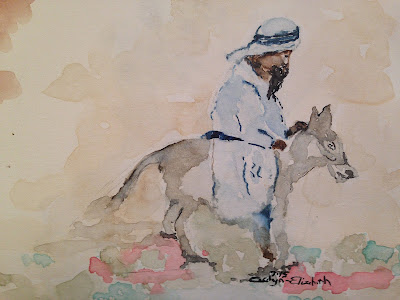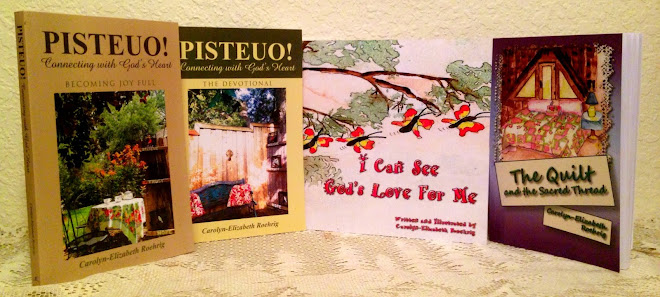She's slow to wake up full. Slow to open eye round bulging. Slow to lift lid shadowed by night sky. But she does. The moon slits the lid open after one full night a month of shut eye, and crescent light shines a little sleepy.
I stand where backyard grass peels back and tilts away down into night shade, and I do the same. Peel back my head till nose tilts straight up at the night sky. And the moon is wide-eyed glory.
Wide-eyed glory. It's what I want.
"Fill my sight with Your glory tonight," I pray it silent, open, and maybe right now I can feel a little of what Moses felt because, like him, I'm tucked into a cleft on this rock called earth and asking to see God's glory.
From cleft I gaze out and a glory full and white in indigo night fills my eyes because somehow the sun strolls long across the sky and kisses me goodnight before it steps down from the horizon; and God strolls by, too.
I can't look straight at the sun, and I can't look straight at God's glory; but I look at the moon and as surely as moon follows sun, and moonlight glows with sunlight after the sun's gone down, I know that I, too, must follow God if I want to glow with the light of His glory. And I do want. And more. I want to be full of His glory, and to glow round and full like the moon at full term.
My open eyes fill with wide moon and I wonder to God,
Why did You blot the moon with shadows? I wonder what the moon would look like without them.
He hears my wondering. "The moon looks like the way you see," He explains.
"Blotchy." That's how I see.
"Yeah," He chuckles kind of amused, "blotchy."
The moon just glows a little blotchy, and so do I. "But God," a pinch of its-not-fair nips me, "the moon doesn't cry."
He knows I know that tears don't wash away blotchy vision. Only the blood of the raw Truth does that. But still, tears are cleansing. They are. And sometimes my sight is improved after tears have rinsed where my heart's been scrubbed clean as repentance.
Yeah, I've been scrubbed like that recently. Seems that where I've been rubbed the wrong way by others is where I've required a good right scrubbing by God. Seems, too, that what things I've complained against are those things I must confess and repent from; and that the blotchy spots in my vision are craters larger than those on the moon and are certainly larger than splinters.
I'm told there's a log in my eye. God says so. And the log in my eye recognizes the offending splinter in another's eye because the splinter's of the same wood as the log. An unrepentant gossip is more offended by a gossip than a repentant gossip; and an unrepentant busy-body is more offended by a busy-body than a repentant busy-body. An unrepentant sinner is more offended by the sins of others than a repentant sinner because the unrepentant sinner orbits toward the wane, but the repentant sinner presses open to wide-eyed wax and begs, "I see!" and "Lord have mercy" in the next breath.
Moon with Craters
"The Beginning of Knowledge." That's the subtitle heading Proverbs, chapter one, in my Bible. The verses are pen-marked and I remember marking them decades ago. The ink is faded now, and I seem to have skipped underlining the phrase, "receive the instruction." I mark it now. "Receive the instruction of justice, judgement, and equity" (Proverbs 1:3).
I want to know what the words "justice, judgement, and equity" mean because I'm told to receive the instruction of them and, as the verses progress to include what I
really need, the fear of the Lord, don't I need some instruction before I know much of anything about that? Oh, I do.
I go to Merriam-Webster on my iPhone. Justice-the process or result of using laws to fairly judge crimes and criminals.
I read it slowly, several times, because the understanding I'm wanting is an understanding that just opens wide in slow phases.
"You're saying, 'Receive the instruction of the process and result of Your laws?'" That's how I read it, and it's different than receiving the instruction of His law.
He lets me think. And I'm thinking that when I complain against this and that in another, may I have the presence of mind to say, "Oh! My vision is blotchy! I must have a log in my eye." And the rest is easy. I don't have to wonder what the log is called because it's usually called by the name of the splinter in the other's eye that offends me till I repent.
"How," I ask God, "can I co-operate with the process and result of removing the log?"
"Go back to the tree." He knows that this morning I tugged a chewed up leaf off the pecan twig above me because it reminded me of what I would look like if Jesus hadn't hung, just chewed up, on the tree as if the crime was His and the law was mine.
I finger the leaf. "How is it fair that You were chewed up by the jaws of sin, the worm of man, and hung on the tree?" I hold up the leaf to make sure He really sees this. "How is it fair, when You committed no crime?"
It sounds a little accusatory, and I don't mean to accuse God. "I don't mean it the way it sounds, God," I confess. "I'm beyond grateful, but," I venture carefully, "how is it fair?"
Lyrics spring into my head that song writers would roll their eyes at. It's not a song I've sung before, but the words sum up the message of a hundred worship songs that I have sung.
It should have been me crucified on that tree,
But He died in my place and I'm saved by His grace.
I would sing them now, except that I'm thinking justice is saying something diffferent. I'm not hearing, "It should have been me." I'm hearing, "Accept as fair use of My law what I say is fair use of My law."
Silence, again. Then, "How?" I have no idea where to begin. I feel like a child learning how to ride a bike and not knowing how to turn it around without skinning my knees on the pavement.
"Do you receive the instruction of justice?" He's asking me if I'll get on the bike.
"But how do I turn it?"
"Sweet girl," my Father's hand steadies the bike, "just turn around every time I say, 'Turn here.'"
"I hope You've got a large box of band aides, 'cause I'm gonna spend a lot of time on skinned knees," I laugh; sort of.
And the lyrics turn here.
Strange to say, "It was fair that Jesus hung on the tree;
That justice was served in an unheard of way and
The sinless One died in the criminal's place."
Strange to say, "It was fair that the blood on the cross wasn't mine;"
If I'd said, "I'll pay," sin would've had it's way,
But the sinless One died in the criminal's place.
"Do you receive the instruction of justice?" He wants an answer.
"Yes! Yes, I do!" I raise my hands in exuberance.
"Whoa there!" He steadies the bike. "Keep your hands on the handles and turn here!"
Bike Riding
I type the word "judgement" in the search box at Merriam-Webster. Judgment: "a divine sentence or decision."
"Ah! Just Ah-ha!" I hear His word different than ever before. Is it because I'm receiving His instruction of justice? Me thinks so.
Receive the instruction of the process and result of His law, and receive as fair the divine sentence His law requires.
It's not instruction for good behavior with warning for bad behavior. It's way more than that. It's His divine sentence carried out, hammered in, nailed down by nails that resemble exclamation points. They do, when they're upside down. And isn't it fitting that the hammer pounded the head of the long sharp exclamation point into the hands and feet of the One who carried out God's justice, and Who would be risen, that I might be upright exclamation pointing to His divine justice?
"Do you receive the instruction of judgement?" He asks.
I know what the instruction is. It's to be an upright exclamation pointing to His justice, not mine.
"Your decisions are better that mine," an understatement if there was one. "You know what should be done, and have done it." I recall all that Jesus did. "Yes," I say it with the daring courage only the humbled possess. "Yes. I receive the instruction of judgement."
Equity.
I type the word,"equity." It means, "the value of a piece of property (such as a house) after any debts that remain to be paid for it have been subtracted."
My breath catches because I am His piece of property. His house. Decades ago I underlined the truth of equity in the light blue Bible with my name inscribed in gold script in the lower right corner. I snap it open, gift from life-long friend of mine who led me on my thirteenth birthday to this God I love so dearly. The ink is faded beneath the words, "What? Know ye not that your body is the temple of the Holy Ghost which is in you, which ye have of God, and ye are not your own? For ye are bought with a price..." (1 Corinthians 6:19-20).
My value has everything to do with holy subtraction. The subtraction of the debt that remained to be paid, but is now paid in full by the One who owns me and lives in me. After the debt for my sin was paid, subtracted off the books, I owned not myself. What a relief! I became nothing to become the holy temple in which God's Holy Spirit dwells. I became the righteousness of God in Christ Jesus when He subtracted my sin. Yeah, I'm still clay on the Potter's wheel, but this lump belongs to Him now and His hands are pressing me just wide-open glory from the inside outward, into the mold of His holiness.
This is the instruction of equity.
"I want to be soft to Your touch, Lord. I want to yield easily." I say it true as can be and I say it with some fear, too, because I know that if I'm soft to any touch but His, I'll be like a moon out of orbit that should be full wide-eyed open, but is sleeping at the wrong time. If I yield to any touch but His, I'll be like a woman with child who aborts because she's afraid of a pain more complicated than labor.
"I want to yield to Your touch, Lord," I say it again because He will fill me with His life till I glow round as full moon and then press outward what He's formed inward-His image. Holy DNA.
I don't want to be asleep when I should be awake. I don't want to be empty as a moonless night when I should be full of glory.
"Lord," I say it delicate, "mold me into a vessel fit to carry Your life. I open the womb of my soul to You. May I carry Your life to full term." It's prayer, shocking prayer, but I mean it because I want wide-eyed glory.
I look at the moon in fullest phase tonight. I have just enough fear of Him to know that He wants me full of Him, too, and that this lump of clay can be a re-do. Does that sound harsh? I think it probably does, but it doesn't have to be. After all, didn't He already follow His own instructions for justice, judgement, and equity? And isn't He the One getting
my mud on
His hands? All I have to do is let Him. Co-operate. And hold the shape He gives me because that's the shape that will house His life and I don't want to be a re-do.
"I receive the instruction of equity." I say it before He has the chance to ask the question. I'm after wide-eyed glory. No more logs in the eye, please and thank you."
Pregnant Woman
Silence. Selah; true and so still that it seems the whole world's stopped spinning. My soul's waxed full and, "Can I stay like this? Can I stay wide-eyed glory?"
He shakes His head, "No," then smiles, and it would be a mixed message except that I know instructions are meant to be followed to the last page. And I've botched enough do-it-yourself projects by now to know that I need step-by-step instructions and even then I'll mess up and I'll have to go back where the mess up began.
"Follow the instruction of justice, judgement, and equity," He repeats His word. I try it on and it fits like a maternity dress over a belly that's not yet round enough.
"I want Your word to fit, Lord." And I cry. I do. Because I want to feel full of His life, not mine. And I know that there are logs in my eyes just as surely as there are craters on the moon. I cry because the knowing hurts. The knowing comes when something reveals the log, and usually that something is an offensive splinter in the eye of an offender that I recognize because the splinter's of the same wood as the log. And I cry because I know that my vision is obscured and I know that there's a wide-eyed glory brighter than a full moon on a clear night, but I don't see that way yet.
I'm bent low. Forehead presses into the yellow life-preserver I store beneath bed and kneel on each morning.
I cry. I confess. I repent.
My knees are skinned. My make-up's tear smear. My head's spinning from too much thinking, and I choose to embarrass myself sheer humble making amends, and then hope that they will be graciously accepted with no further discussion yet, "Even that," I confess to God, "even if I'm shorn with questions and humbled further," I venture where I've not gone before and sometimes it feels like the back side of the moon to go the belly of the soul, "You say the entrance into Your kingdom is like going through the eye of a needle and there ain't no way I'm getting through with an expecting soul and enough wool for two sheep."
"Ha!" Yeah, He appreciates my humor. I just know He does.
And then? Well, this of river tears dislodges the log and it floats away. Just floats out of sight and it seems ridiculous to me that I didn't see that log before.
And then? The tears stop. And I begin pouring thanksgiving all over Him. "I see Your mercy!"
He's poured His mercy all over this.
I see mercy in the quoted prayer a sister-in-Christ emailed me this morning.
I see mercy when this joyous life-guard daughter of mine who works ten hour shifts under the blazing, bleaching, browning sun parallel parks the family van with perfection and passes her driver's test with a 97% score.
I see mercy in the cheerful woman at the DMV counter who twinkles out, "What happened? Did the instructor fall asleep? Because no one passes with a 97!" Twinkley eyes line with laughter at her own joke and, "Congratulations!"
I see mercy in the celebratory donut the lady at the corner coffee shop gave the newly liscenced driver. "Here's the iced mocha you ordered, and here," she presents a white paper bakery bag, "is a celebratory donut!"
"Thank you!" We laugh because this is just so fun!
And I say it and mean it for God. "Thank You for the donut."
written by: Carolyn-Elizabeth Roehrig















